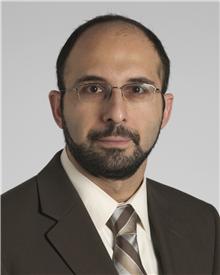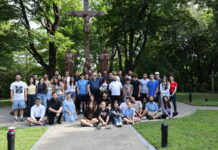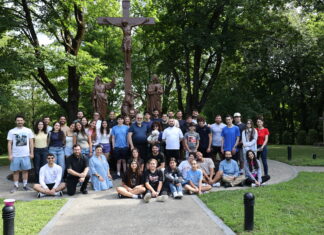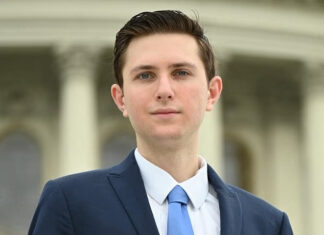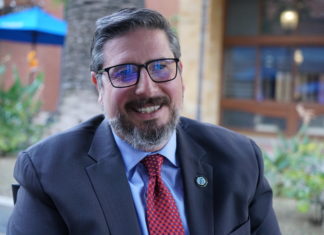PIONEER, from page 4
After graduating from university — and getting married — Avitsian was required to partake in two years of mandatory military service like his fellow male graduates. However, his father’s illness made him the primary breadwinner of his family and thus excused him from military duty. Instead, Avitsian was sent to serve as a doctor in rural regions of Iran for the next two years. As chief of healthcare at a clinic north of Tehran, he would return home to visit his family every now and then. Soon, his first daughter, Anna, was born.
Meanwhile, his wife was pursuing her degree in translation while working as a secretary. She learned about immigration to Canada, and they decided to apply. In 1996, the family immigrated to Canada.
“In Canada, the healthcare system is all government-based and it’s very difficult if you’re an international graduate. I tried finding some jobs until I could pass the entrance exams to get into a residency for a specialty in Canada. It wasn’t easy,” Avitsian said.
Despite the initial difficulty of finding a temporary job to support his family while studying, Avitsian eventually met fellow Armenians, one of whom offered him a job at his Subway sandwich store. Avitsian worked the night shifts while studying for his exams and took care of his daughter during the day as his wife took college courses and worked at the same time.
Numerous friends encouraged Avitsian to take the American exams as well. After passing these, Avitsian applied for an internship and residency in the United States.
“I was with some other foreign and international graduates, and we were looking at the residency programs and the hospitals in the US. When we came down to Cleveland Clinic on the list, someone said, ‘Oh, Cleveland Clinic, that’s a reputable place. They’re not going to take us. It’s probably a waste of time to apply.’ I agreed, but when I came back home, I saw that I still had some extra applications, so I thought, ‘Well, I’ve been sending them so many places, why not just send one more to Cleveland Clinic?’”
As it turned out, Cleveland Clinic was the first hospital to ask him for an interview. Avitsian hopped on the next Greyhound bus and made his first entry into the United States, in 1998.
The following day, Avitsian interviewed with one of the physicians at Cleveland Clinic. By the end of the day, the program director had already offered Avitsian a head position at the prestigious hospital. After several more interviews with other institutions, Avitsian decided to accept the position at Cleveland Clinic.
A few months later, in November 1999, Avitsian moved to the US, along with his family. He began as an intern in internal medicine. A year later, his second daughter, Taleen, was born.
After graduating from the residency program, Avitsian chose to study neurosurgical anesthesiology for a year. He was soon hired as an associate, and eventually a member of the full staff, at Cleveland Clinic. He is now an associate professor of anesthesiology at the Cleveland Clinic Lerner College of Medicine of Case Western Reserve University. He is also the section head for the Neurosurgical Anesthesiology Section, where he oversees all procedures related to neurosurgery and the anesthesiology involved. As program director of the Neurosurgical Anesthesiology Fellowship Program, he trains two fellows every year to become neurosurgical anesthesiologists. He is also a member of the Board of Director of the Society for Neuroanesthesia and Critical Care and currently a candidate for the chair of the Department of General Anesthesiology.
Avitsian has traveled extensively to give lectures and edits a variety of scientific journals. He is also involved in the innovation of medical devices. One of his first patents was the Central Line Catheter, which is inserted into the vascular system of a patient to direct fluid flow.
“When I was a kid, I liked to mend and fix things and make things and design things, and now I’m doing it in medicine. Cleveland Clinic has a whole building just for inventors and inventions, so it is a very helpful resource,” he added.
Avitsian strives to keep the Armenian spirit alive with his family, speaking Armenian to his children and teaching them to read and write in the language. In the medical field, he has seized many opportunities to give back. He got involved in the Armenian Medical Society in Armenia and quickly established a rapport with Dr. Gohar Kyalyan, dean of the Yerevan State Medical University, whose strategy was to build a relationship with Armenian physicians in the diaspora. Avitsian now regularly attends medical conferences in Armenia and Karabagh.
“When I lecture, I lecture in Armenian, as it’s easier for the physicians to understand. And when I return to the US, I sometimes do lectures online, using Skype,” Avitsian said.
Avitsian also joined the Center for International Medical Education in Cleveland Clinic, which attracts physicians from other countries for observation. He has arranged for many physicians from the Yerevan State Medical University to come and train in Cleveland for a few months.
“It’s not only the practice of anesthesia or any kind of medical specialty. It’s also about how a hospital is run. In the US, the day starts very early and we work a lot. In Armenia, the system is different. They start much later in the day, so there was a lot that the Armenian physicians could learn from the US,” Avitsian said.
For some physicians, Avitsian noted, the allure of the US — with its comparatively bountiful opportunities — is overpowering.
“Nothing is perfect, and one of the problems that we have faced is that those physicians who come here, they’re coming out from a country which doesn’t promise as great a future as the US does to its medical graduates — and this does not only apply to Armenia. So some of the visiting physicians try to go into residency and stay here and not return, which is natural. For everything that you do, there are some sacrifices that you have to endure. But again some of them do go back, and they become very successful physicians, and I’m still in contact with them,” Avitsian explained.
His latest project is to implement a stroke program in Armenia.
“Stroke is a disease that not only kills, but also disables people, and those people become a burden on the whole economy of the country. So we’re trying to see whether we can decrease stroke or treat it fast enough that they won’t become disabled. I cannot say enough about how much Dr. Gevorg Yaghjian has been influencing this: he is one of the most active people I’ve seen in my life. He has the best networking: every opportunity he gets, he talks to Armenian doctors. Many times he could have lived in the US — he had the opportunity — but he is patriotic enough to go back and continue his work there while collaborating with us here,” Avitsian said.
Along with his extensive work in the medical field, Avitsian remains an active member of his local Armenian community, specifically St. Gregory of Narek Church in Cleveland. He sings in the choir and occasionally acts as sub-deacon. Avitsian says that his faith remains a central piece of his identity.
“I cannot thank my mother enough, who early in my childhood gave me the Bible to read…I believe you cannot just close your eyes and believe the faith. You have to read and compare, and I was in a country which was religious, even though I wasn’t of the same religion. But I actually was brought up in a faith-filled environment, and that helped me to read more and more and then decide for myself,” he said.
Although Avitsian has served on the parish council, his role in the church now revolves more around keeping the Armenian spirit and identity alive in the community.
“If you compare the US to other countries, the environment is more conducive to losing your cultural identity. We’re always thankful to the US for accepting us, but we still think that keeping your identity is an important thing,” he said.
Despite his achievements, Avitsian remains incredibly humble. When asked about his greatest pride, he shies away.
“Honestly, I don’t want to be proud. Everything that I have done, I don’t see as my own accomplishment: I see it as doing a duty from God and walking in the path that I was supposed to walk,” he said.
He recalls one night, when he was mopping floors at Subway, his brother-in-law came in to see him.
“I could see tears in his eyes. He said, ‘Rafi, what were you doing back home? You were a doctor. And what are you doing now? What are you doing, washing floors?’ It was humbling, and now I don’t look down on anyone because of their work, because I’ve been there,” he recalled.
Avitsian credits this experience with keeping everything in perspective.
“When you are faced with obstacles and you conquer them and you don’t lose your hope and your faith and then you achieve [your goals], that is when you become humble. That is when you look at other people, whatever their job or calling, and you think, ‘Maybe that’s another doctor, maybe that’s another angel.’ Out of the difficulties that someone goes through, they can either become aggressive and lose hope and just let go, or they can keep their hope and be humble and continue knowing it’s going to get better,” he said.



